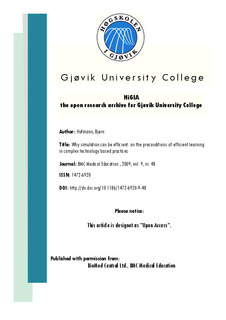Why simulation can be efficient: on the preconditions of efficient learning in complex technology based practices
Peer reviewed, Journal article
Permanent lenke
http://hdl.handle.net/11250/142448Utgivelsesdato
2009Metadata
Vis full innførselSamlinger
Sammendrag
Background: It is important to demonstrate learning outcomes of simulation in technology based practices, such as in advanced health care. Although many studies show skills improvement and selfreported change to practice, there are few studies demonstrating patient outcome and societal efficiency. The objective of the study is to investigate if and why simulation can be effective and efficient in a hi-tech health care setting. This is important in order to decide whether and how to design simulation scenarios and outcome studies. Methods: Core theoretical insights in Science and Technology Studies (STS) are applied to analyze the field of simulation in hi-tech health care education. In particular, a process-oriented framework where technology is characterized by its devices, methods and its organizational setting is applied. Results: The analysis shows how advanced simulation can address core characteristics of technology beyond the knowledge of technology's functions. Simulation's ability to address skilful device handling as well as purposive aspects of technology provides a potential for effective and efficient learning. However, as technology is also constituted by organizational aspects, such as technology status, disease status, and resource constraints, the success of simulation depends on whether these aspects can be integrated in the simulation setting as well. This represents a challenge for future development of simulation and for demonstrating its effectiveness and efficiency. Conclusion: Assessing the outcome of simulation in education in hi-tech health care settings is worthwhile if core characteristics of medical technology are addressed. This challenges the traditional technical versus non-technical divide in simulation, as organizational aspects appear to be part of technology's core characteristics.
Beskrivelse
Originally published in the BMC Medical Education: http://www.biomedcentral.com/bmcmededuc
